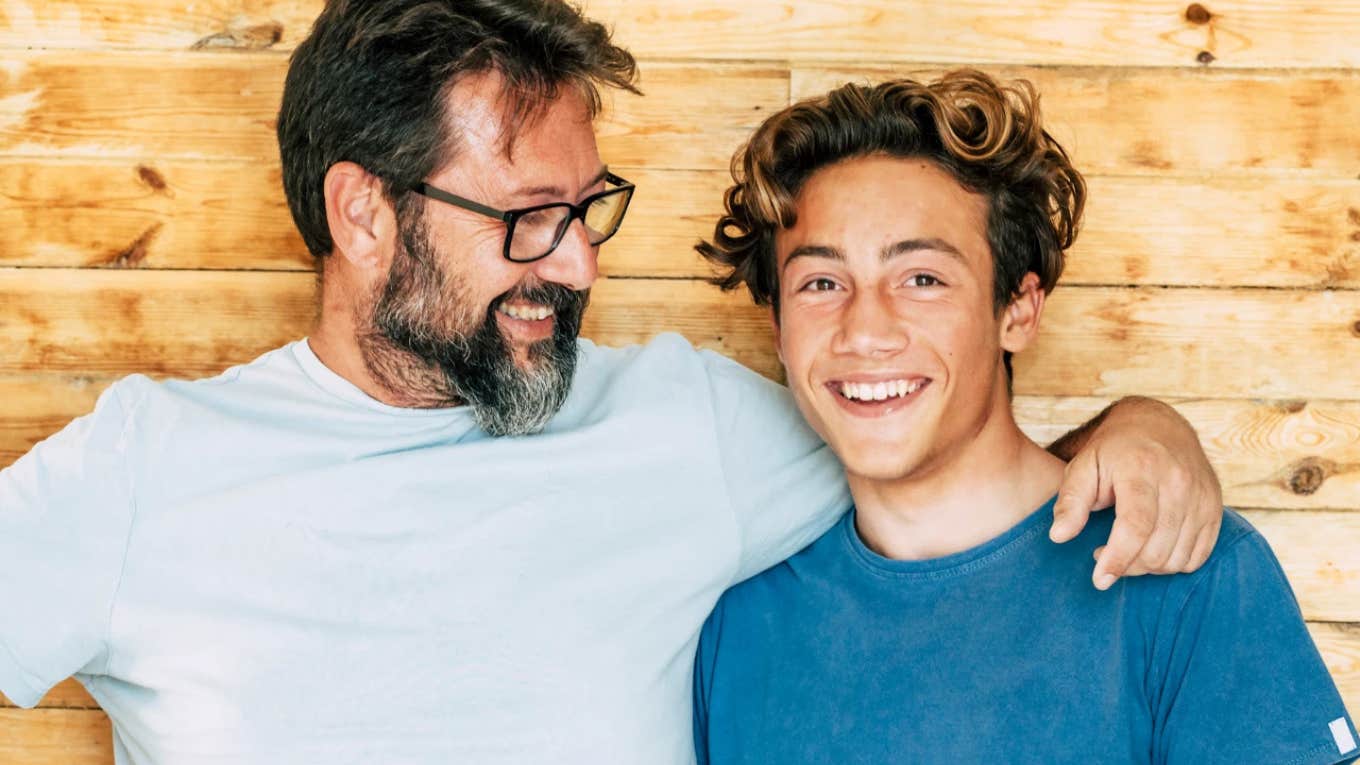My Gen-Z Son Claims I'm An 'Ancient' Millennial Who Doesn't Get It — 'Your Generation Is Cynical And Stagnated'
I was a single millennial father. My Gen-Z son turned my world upside down.
 simonapilollatnf | Canva
simonapilollatnf | Canva One day in March of 2021, my son, who had just turned 16, came home urgently. At the time, I was living in Washington D.C., while he was in New Hampshire at a boarding school which he had joined almost two years earlier.
He was a junior. Unlike millions of students around the world, forced to take classes online because the whole world had shut down due to the COVID-19 pandemic, my son was one of those who had the chance to go to class every day.
However, it came at a price: they lived in a bubble at their boarding school. No one was allowed in, and no one was let out. The pandemic forced his school to implement new rules that limited social interaction.
The pandemic forced his school to implement new rules that limited social interaction.
The impact of the Covid pandemic was huge on the mental health of a large majority of Gen-Z students, including my son.
One of the solutions put in place by the school to tackle the rise in emotional issues was to often send students back to their families. This was the case with my son.
I was happy to have him home. Still, I wondered whether it was in his best interest to come home as the finals were looming. What I didn’t know was that my son’s return would plunge me into a new world and profoundly shake up my foundations.
My son is currently 19 years old. He grew up in Paris, France, where he went to school until 5th grade. Then we moved to New York, where he attended the Lycée Français, a private French school in Manhattan with a bilingual curriculum, before being accepted into a boarding school in New Hampshire.
 California / Shutterstock
California / Shutterstock
He is currently a college sophomore in California. My son was immersed in different cultures and has learned to navigate a diverse set of environments. He and I only communicate in French. “Dad, you assume that I want you to address me using the he, his, and him pronouns,” my son said to me as we were immersed in a conversation about his mental health.
I was taken by surprise by this remark, made in a very calm tone. My son never raises his voice. He speaks in a calm voice and always weighs his words like the keen observer that he is. “I don’t understand,” I replied. “As far as I know, there has not been a change in your life. What do you mean? Just a few weeks ago I addressed you using the same pronouns. What’s changed that I’m not aware of?"
“Nothing,” he said, “but it would be good if you asked me my pronouns to avoid offending me. I think it’s a sign of respect."
“What are your pronouns?” I asked him. “He, his and him. Yours?” he answered. “The same. Nothing has changed for me either,” I replied.
I had already been introduced to the world of pronouns before, but this was the first time the subject was brought up at home and by my own son. I knew my son was concerned about issues of equality.
When he was at the Lycée Français a few years earlier, one of his friends wanted to transition M-F. While going through the process, this friend wanted to use the bathrooms reserved for women.
My son and others supported her. For weeks, my son spoke many times about this friend, explaining to me that he didn’t understand the reluctance of cisgender women and their parents to allow his friend to use the bathrooms she felt comfortable using.
For him, his friend identified as a woman, something that the whole world should respect and accept. That was her identity. I was confused when my son and I were speaking back then as I kept switching between he/his/him, she/her/her, and they/them/their to refer to his friend.
“Dad, why is it so difficult for you to say she/her/her when you talk about her?” he said to me at the time.
For my son, I shouldn’t have had any difficulty adjusting my pronouns regarding a friend of his whom I had known for a few years as a boy. I felt lost. I thought I was narrow-minded but then I asked myself: how is it possible to switch so fast?
I needed a whole software upgrade. I did not see the need to educate myself at the time on questions of pronouns which underline the question of gender identity.
I told myself and thought I was quite open-minded both by the nature of my work and by my background. I navigated different cultures and interviewed people from various social and political backgrounds and different segments of society.
I didn’t understand these questions were the face of the social values of the Gen-Z generation, impatient to make their mark on the world.
These Gen-Z values have shaken up older Millennial and Boomer generations.
“Why do you think that I must ask you what pronouns I should use toward you?” I asked my son.
“It is a sign of respect and empathy for the people you are talking to; by doing so, you show that you are conscious of people’s differences, that do not espouse prejudices, and that you are open-minded. It makes the people you’re talking to feel comfortable and included,” he responded.
The lesson had only just begun. For the first time, I looked at my son differently. Was it this child that I raised alone since the death of his mother when he was only two years old?
Many would say that my son had changed due to indoctrination from his prestigious boarding school and college; many would have said that he had become a woke follower; and that he had been brainwashed.
I would tell them that they are missing the point by a mile. My son may be only 19, but he is mature. He prides himself on being a free spirit.
 BearFotos / Shutterstock
BearFotos / Shutterstock
From talking with my son and his friends and other parents raising Gen Z children, that a key characteristic of this generation is to think that they are always right.
This has allowed me to better accept exchanges with my son because he lets me talk and listen even if, in the end, he does not change his mind. I, on the other hand, am in accelerated training.
Neither my son nor his friends are the spokespersons for Gen-Z. They are nevertheless part of this generation and rub shoulders with their peers at school, in school and sporting activities, and on social networks and online gaming platforms. They reflect, in one form or another, the artifices of this generation.
In my education process, I understood that my son and his friends view us, the generations preceding them, as cynics; people who at one time dreamed but who have grown old without accomplishing anything. So, they learned from us, our failures, our inability to act, our cynicism. This is why they want everything, and they want it immediately.
This is why they want to change the world right now. This is why they want a world that is a reflection of them, effective now. They do not want to make concessions for fear of falling into the same cynicism as we do.
They don’t like phrases like “Do you remember when we were young when we wanted to change the world?” They don’t want to have regrets. They believe these are excuses for those who took the easy path in life.
This is also seen in their environmental activism. They think that we are not just in a state of emergency to save the planet. They believe that it is a question of survival. We must act and do it now.
Gen-Z does not believe in us older Millennials — they believe that we have stagnated.
They therefore reject the institutions that they suspect of seeking to maintain the established order and the status quo at all costs.
They have more trust in individuals with whom they can identify or whose authenticity they find acceptable. They admire those who act. For example, they see influencers, notably the biggest of them all, namely Elon Musk, as the new generation of leaders.
Not that they think that these new figures are perfect or that everything they say is correct. But they accept their flaws and feel that they at least are trying to achieve something. It all comes down to action. Immediate action. For example, my son is a fan of Musk. When I asked him what Musk has that the political leaders of our time don’t have, my son answered this:
“Dad, at least he did something; he makes us dream about the conquest of Mars; he did important things for the environment with Tesla. I see what he did. What have the politicians done?”
No matter how much I argue, nothing works. My son and his friends want us to change and adopt their ideals and impatience but don’t want to meet us in the middle.
When I tell my son that his generation has to take the time to educate and convince people so that they get used to a changing world, he tells me that it’s not their job. It is up to me and my generation to make the necessary effort.
This disconnection is also present in everyday actions. When I call my son on the phone he very rarely picks up. He tends to send me a text message after my call to ask if there is anything urgent.
The few times he responds, there is usually silence on the other end of the line followed, after several seconds, by a wary “yes” mixed with suspicion. It is as if I were attacking him by calling; as if I were violating, as they say now, his private space.
From this, I realized that it was better to communicate via text messages. Still, even when I do, he takes a long time to respond.
No matter how much I complain, the changes are minimal. For a while he responded a day later; now he responds an hour, even two hours later. Yet, I know that his phone never leaves him. On the other hand, when he calls me, he expects me to pick up right away.
 fizkes / Shutterstock
fizkes / Shutterstock
The amazing thing about this impatient Gen-Z generation is that they are sometimes not that different from us or from those who were here before us.
As soon as they face adversity in everyday life, they immediately run to their parents. This is the case with my son.
“Dad, can you make an appointment for me with this doctor?” “Dad, how do I do this?” “Dad, I lost this, what should I do now?” Basically, behind their image as agents of change, they remain like all other generations. They know where and when to seek their parents when they need them. In those moments, their know-it-all and always-being-right side evaporates in a few seconds.
Listening to my son and his friends, I noticed that they highlight collective responsibilities and obligations but disregard their duties. It is as if the individual comes second. But at the same time, they celebrate the individual by making them a priority over institutions. They celebrate values like authenticity that are attached to the individual. I’m having trouble following. I am lost.
The worst thing is that we tend to characterize most young people today as 'woke.' It makes my son smile. He tells me every time that we elders describe as woke everything that challenges our vision of the world.
He tells me that this is proof of our lack of imagination. He tells me that he does not understand why I and the other veterans are perplexed when someone like him praises capitalism but at the same time says he is in favor of a significant increase in the minimum wage or pleads for a large social safety net.
For him, if we want to perpetuate capitalism, everyone must benefit. Which is no longer happening, according to him.
“If you want a proletarian revolution, as Karl Marx said, continue to remain deaf to the cry of alarm of the have-nots. They are going to revolt like in 1789 in France,” my son regularly warns me, although he is very critical of the French system because, according to him, it punishes wealth.
My son says I and the other “ancients” don’t get it. They don’t want labels. They don’t care about labels. What matters to him and his friends is to do what is right. It isn’t about ideology, he says.
“The old ideologies are dead. Anyway, they are old. We are building our own. Your generation must get used to it,” he proclaims confidently.
Maybe he is right. I am an “ancient.” But to use the metaphor of the Malian writer Amadou Hampâté-Ba, an old man who dies is like a library that burns down.
Luc Olinga is a French journalist living in New York City. He worked for Agence France-Presse (AFP), the world's third-largest news agency, for more than 15 years in Europe and in the United States and covered politics, finance, tech, and social issues. He also worked for TheStreet as their Tech Lead.

